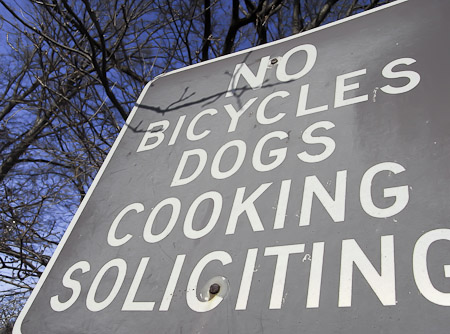About NativeBergen
Iíd like to find all that is exotic, cool, creative and green, in New Jersey, New York and the world around us.This state has become very urban and suburban. There are a lot of highways, malls, big-box stores and pollution. At the same time, our creativity may be waning at the expense of our desperate socio-economic pursuits.

The idea for NativeBergen started in park near my house. There is a prominent sign that tells all visitors what is not allowed.. When I saw it, I thought, ìWell, what can you do here?î I decided that I would learn the name of every plant that grew in the park; since you couldnít do much else. I got the National Audobon Societyís Field Guide to the Mid-Atlantic States and started my quest. Anyone who has done a similar exploration will quickly learn that New Jersey is full of tenacious import plants, belligerent exotic birds, and a human footprint that covers a majority of the landscape. Very few of the plants I found in the park were indigenous to this area. A good portion of the plants we find in our state parks and natural land are species that have more than outgrown their ornamental import status. When I did stumble across an indigenous plant, I found myself coveting it. The native plants in New Jersey are now more exotic than their exotic counterparts. The more I learned the more I wanted to learn.
There are some native plant resources online but nothing too inspiring; a lot of depressing Inconvenient Truth styled content or glib treehugger fodder. I found myself looking for an online resource that made native plants accessible and feasible.
Native plant proponents argue that our horticulture choices are leading to a monoculture ecosystem. A singular flora culture will starve out a diverse population of fauna. That singular plant culture could also become an easy victim to a singular opportunistic pest. With even less public outcry then native plantsÖour sense of creativity and individuality is even more diminished. Television, politicians, and a few Internet giants (among others) want us all to think in distinct and easily marketable patterns.
Native plants are a tall order in New Jersey. The growing season is but a half a year long and the diverse and dense human population favors whatever the chain home improvement/hard stores will sell them. What do these big-box stores favor? Whatever will grow here profusely, whatever mom will just love and whatever will sell like narcotics. Nobody cares where it comes from or what impact it could have on the local ecology. Native plants alone would make for a very thin content offering, easily inclined toward dourness and a lack of appeal.
I’ve also noticed an astounding lack of creativity when it comes to green pursuits in the New York tri-state area. This area has some of the most prestigious art schools and and universities in the world and only just recently are we starting to see the world take note of some of the green pursuits in this area. New York City has some notable resources but New Jersey? Well, that’s to be seen. Gardening magazines and eco/environmental media outlets have a way of alienating people. Usually either too highbrow, too dogmatic or just plain boring to non-plant nerds. If I’m successful, I hope to change all that.
So the idea for NativeBergen is to explore highlight and cultivate the Mid-Atlantic regionís exotic green offerings.
Native is a reference to my fascination with native plants. It also is a reminder and admonishment to enjoy and champion what we have here right under our nose and feet. Indigenous is great but Iëll take immigrants too, as long as it is done with creativity.
Bergen is for Bergen County. If there was one place that confirmed and denied all of the New Jersey stereotypes in one stroke; it would be Bergen County. A direct spill over via the George Washington Bridge from the largest English speaking city in the world, this area may never reach Kyotoís status for exotic green but we can dream and I can write about it.

The kind of stuff Iím interested in:
Unique gardens, unusual landscapes, exotic residential or business yards, Japanese gardens, Korean, gardens, Chinese gardens, British/European gardens, non-traditional ornamental gardens, rooftop gardens, green/living walls, moss gardens, topiary gardens man-made ponds, rock gardens, wild spaces, natural attractions, native plants, rare plants, exotic plants, un-New Jersey anything, and the like.
